Deciding what to feed chickens is one of the first things you’ll need to do when you bring a flock home. Are you trying to avoid corn or soy? Want to feed them organically to avoid GMOs? No matter what your preference is I suspect you’d like to know how to feed your chickens without breaking the bank!
Originally published September 2014; this post has been updated.
I’ve kept backyard chickens for more than two decades and consider myself fairly successful at it. We get eggs, we butcher roosters (and even hens that are past laying age).
But feeding chickens commercial feed can get expensive quickly! Over the years I’ve figured out what to feed chickens in order to keep costs down.
There’s a lot of talk among chicken folks about what chickens need and feeding them the “right” foods. A high protein diet. Balanced nutrition. Amino acids. Yadda yadda. Don’t get me wrong — I want my girls to be full and happy.
But I submit this crazy notion: The idea of a perfect diet for chickens is likely the by-product of production farmers looking for the highest egg-laying yield.
Take a Peek Inside My Book!
Get a free excerpt from my book, Attainable Sustainable: The Lost Art of Self-Reliant Living! You’ll also get my free weekly newsletter, complete with recipes, gardening tips, and a little peek at what’s going on around here — both the zany and the mundane.
The standard chicken diet generally includes:
- Lay pellets — A nutritionally balanced complete feed pressed into bite sized pellets.
- Lay crumble — The same type of feed that offers a balanced diet but in smaller “crumbled” pieces. (I suspect this product was invented when producers noticed the waste left behind when making pellets…)
- Scratch — A combination of cracked grains such as corn, barley, oat, or wheat, often scattered as a treat.
Purchasing all of the feed your laying hens need from the local feed store can get expensive! The ideas below have served my backyard poultry flocks well, but note that young chicks will need to be started off with a chick starter feed, which is produced as smaller pieces with the protein needs of baby chicks in mind.
Once these birds are at least 6 weeks old, I start implementing some of these tactics so they are used to eating this way.
Feeding Chickens on a Budget
If egg production and sales are an income for you, it’s probably worth the expense for a perfectly balanced food.
Backyard farmers and urban chicken keepers who are primarily putting eggs on their own table have a bit more flexibility. Instead of paying high-dollar for the most nutritionally balanced feed (that for many of us is imported from a distance) we can be creative in how to feed chickens for less and save money at our local feed stores.
After all, the feral chickens that are so prolific here seem to be doing just fine on what Mother Nature provides. We can garner plenty of cheap chicken feed ideas from these wild birds.
How Much to Feed Chickens
I feed my chickens twice per day, morning and night, offering a combination of layer pellets and a soaked and fermented grain mixture. What goes into the grain mixture varies based on what’s available, but it can include whole or rolled oats, whole barley, and sunflower seeds.
Mixing a combination of grains allows me to make a homemade chicken feed that they love, incorporating less expensive grains.
In addition to the commercial feed, I try to always incorporate some of the options listed below. Just how much of the commercial feed I offer depends on the availability of my supplemental foods. If black soldier fly larvae are prolific, say, I feed less.
If you have the space to let your hens out of the chicken coop area, free range chickens are usually quite good at foraging for food. My current set up includes a smaller fenced-in area that houses the coop; this opens up onto a larger fenced area where they can roam.
I keep them in the smaller area for the early part of the day so that they will lay eggs in their nesting boxes, then let them out in the afternoon. Here I give you—in no particular order—some of the supplemental food sources we use for our girls to reduce the amount of layer feed we buy.
Compost
I’ve written before about putting my girls to work in the compost pile, but I didn’t focus solely on its value as a food source.
Added to a compost pile inside the chicken pen, our kitchen and yard waste quickly becomes host to a wide variety of protein-rich tidbits for the chickens: Worms, pill bugs, larvae, centipedes, and cockroaches infiltrate the compost, helping to break it down and unwittingly volunteering to be lunch.
My hens will jump into the compost to poke through what’s available on top, but to get to the really good bugs I use a pitchfork to turn the pile a bit or scoop some out. Let the buffet of free chicken food begin.
Bugs
Speaking of cockroaches (yes, gross, but I live in Hawaii — they’re a fact of life) I’ve accidentally discovered a number of ways to trap them. Taking it a step further, I trap them on purpose to feed to the chickens. They are a favored treat.
Got cockroaches? Here’s what you do: Stack several egg cartons or small garden pots and set them in a bucket. Tuck the bucket out of the way for awhile. When you need a little something to feed the girls, pull the egg cartons or pots out and separate them right in the pen. Cockroaches will scatter and the chickens will be all over them.
Another trick for adding bugs to your hens’ diet? Keep a piece of plywood in the pen, flat on the ground. After several weeks or so, flip it over and voila! Dinner!
If you’re eradicating beetles in your garden, they’re great treats to feed your girls.
Kitchen Scraps
There are some scraps that my chickens love, others they won’t touch. (Scroll down for more on just what chickens can eat.) This seems to be quite variable from flock to flock, so you’ll just have to pay attention to see what your backyard chickens eat and what they pass by. I try to feed kitchen scraps I know they’ll eat (like tomatoes), to avoid a bunch of kitchen waste in their pen that will only serve to attract rats.
Before you decide that your hens won’t eat certain scraps, though, do as Laura at Bit of Earth Farm does, and try cooking them. While chickens won’t eat raw potato peels, they will devour those that are cooked.
One thing I will address here is the fact that I do give my chickens meat scraps. Even chicken. I know it sounds nasty to some people, but when I’m done simmering a turkey or chicken carcass for broth, it goes straight out to the hens. And they thank me.
Growing Grain for Poultry
I’m not talking about fields of wheat here. (Though if you have fields of wheat, I suspect you’ve got some pretty happy hens.)
I’ve grown amaranth on the borders of my garden as a supplement to my hens’ feed in the past, and I just started more seeds. I scored some sorghum seed at my local seed exchange to experiment with, too.
I don’t have silos full of grain by any means, but growing grain on site allows me to cut off seed heads as they mature and toss them to my backyard chickens. It helps me to vary the menu in the coop and cuts down on the amount of imported chicken feed I need.
Go here to learn more about growing grain — even in a small garden — to reduce feed costs.
Grow a Chicken Garden
You can pick up a packet of seeds for about $3. Let’s say that packet contains 30 seeds. That’s ten cents per seed. Depending on the crop, that ten-cent investment could net you many pounds of produce grown on site and vastly reduce your feed bill.
Assuming you’ve got space to plant a little extra for your backyard chickens, this makes so much sense. Here’s a list of garden plants to feed your chickens without making a run to the feed store.
Veggies from Friends
If you have a favorite farmer who grows organically, let them know you are raising chickens. If they’re not using their culled veggies themselves, they might be happy to share. We scored several large bags of too-far-gone broccoli at the farmers market awhile back. Happy, happy all around!
Worms
Set up a $5 vermicomposter right inside the chicken pen and let the worms handle the kitchen scraps your hens won’t eat. Once the worms start reproducing at a steady rate, scoop out a handful of worms and toss them to the girls.
Fodder for Feeding Chickens
One of the best reasons for sprouting grains into fodder is that it helps stretch your animal feed expense. Fifty pounds of whole grain can be transformed into as much as 300 pounds of fodder simply by sprouting it. Sprouting grains increases their nutritional content and boosts protein content slightly.
Feeding Chickens Eggshells
While not really a food source, a lot of people buy oyster shells to boost their flock’s calcium. Eggshells will do the same thing for free. No, giving the eggshells back to the hens will not encourage them to peck at their eggs.
I’ve been doing this for years and have had only one hen who insisted on pecking her eggs open. Just crush the shells into pieces and feed them back to your flock. Trust me. They won’t recognize them as eggs.
Commonly Questions About What Chickens Can Eat
Chickens can eat a lot of the same things you and I eat. Dinner and cooking scraps always go out to our hens. But people often ask about specific items. Here then, are answers to some of those common questions.
Can Chickens Eat blueberries?
Yes they can. They love them. I can’t imagine having enough excess blueberries that I’d feed them to my hens, but if you do, go for it!
Can Chickens Eat Strawberries?
Yes. Given the chance to free range in a garden, they will happily devour your strawberry crop. Instead of letting this happen, I recommend feeding your chickens the strawberry stems and hulls after you’ve eaten the berry itself. Or feed them the trimmings after making this strawberry compote. They’ll be thrilled.
Can Chickens Eat Apples?
Yes. Toss them apple cores or an entire apple and they’ll peck away at it. Maybe you question whether or not chickens can eat apples because apple seeds (or pips) have been rumored to have cyanide in them. I’ve tossed apple cores to my hens for 20+ years and never had a problem.
Can Chickens Eat Bananas?
Absolutely! And they love them. We often have an abundance of bananas here and feeding chickens bananas is a great way for us to supplement their diet. They’ll devour overripe bananas. I usually peel the bananas before feeding them to the chickens.
Can Chickens Eat Tomatoes?
Yes. And again, set loose in the garden, they’ll ruin every tomato in reach. If your crop is abundant, chickens will definitely eat the tomatoes that you don’t. In fact, I like to plant cherry tomatoes on the outside of the chicken run, threading the plant in and out of the fence. As the tomatoes ripen and drop, the chickens will gobble them right up.
Can Chickens Eat Pineapple?
Chickens can eat pineapple — it certainly won’t hurt them — but I’ve found that my hens don’t particularly care for it. Yours might. Try tossing the pineapple skins to your chickens to see if they’ll peck off any remaining fruit.
Can Chickens Eat Celery? Or Onions? Or Carrots?
Yes, yes, yes. They can. But in my experience, they don’t really love veggies raw. My chickens will eat celery (and onions and carrots) when cooked. These items in leftover soup make them happy. And yes, I do actually cook food for my hens on occasion. Potato peels, carrot trimmings, and pumpkin rinds are a couple of items that get turned into chicken food by cooking. Instead of sending them to the compost pile, I put them in a lidded casserole dish with a bit of water and bake them in the oven when I’m cooking something else. Once cooled, the chickens will eat them.
Can Chickens Eat Avocados?
This is a tricky one. Avocado comes up on the what not to feed chickens list quite frequently. But I can tell you that I live in a place where wild avocados drop to the ground and feral chickens eat them daily with no problem. I do toss overripe avocados and avocado peels to my chickens. They tend to peck the flesh out of the skin and leave the skin behind. Avocados are not their favorite thing to eat, but I’ve not found them to be detrimental to their health.
Can Chickens Eat Meat?
They can, and they love it. I mean, knock down your neighbors to get at it kind of love it. That said, this is an ethical question for some. Personally, I do feed my chickens meat, but I know other people who feel like this crosses a line (especially when feeding leftover chicken scraps).
What Not to Feed Chickens
This is a short list, really, and much of it is common sense.
- Do not feed chickens things like candy and junk food. It might not kill them, but it’s not healthy.
- Do not feed chickens moldy or rotten food. Overripe fruits and veggies are fine, but avoid giving them food that’s really gone south.
As an aside, I’ve found that chickens are pretty savvy and simply won’t eat the things that they don’t like or might make them sick.
Hints & Tips for Keeping Chickens in Your Backyard
- How to Grow Fodder for Chickens
- Make a Chicken Swing
- Feeding Chickens on a Budget
- Butchering Chickens
- Mistakes I Made in the Chicken Coop
- Put Your Backyard Chickens to Work in the Garden
- Grazing Boxes for Chickens
- Plant a Chicken Garden
- Do Your Hens Need Supplemental Light?
- Chicken Coop Supplies
- Controlling Mites
- Keeping Chickens Cool in Extreme Heat
- Build a Chicken Coop Extension from Pallets
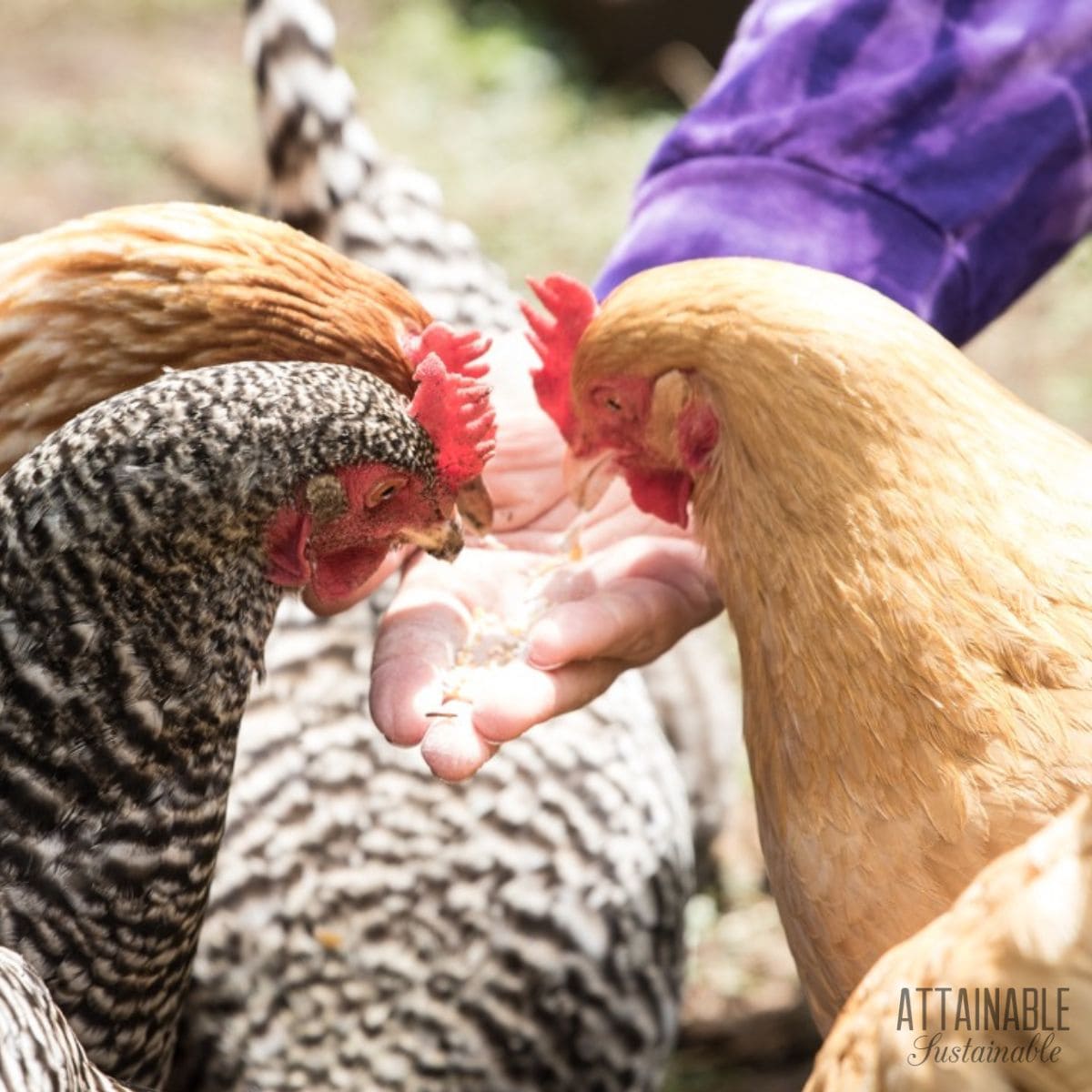
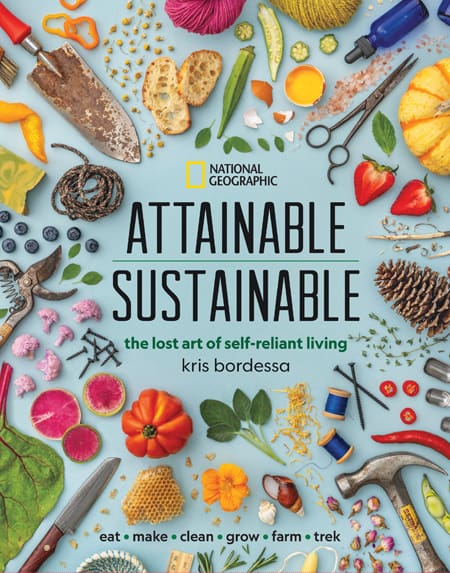
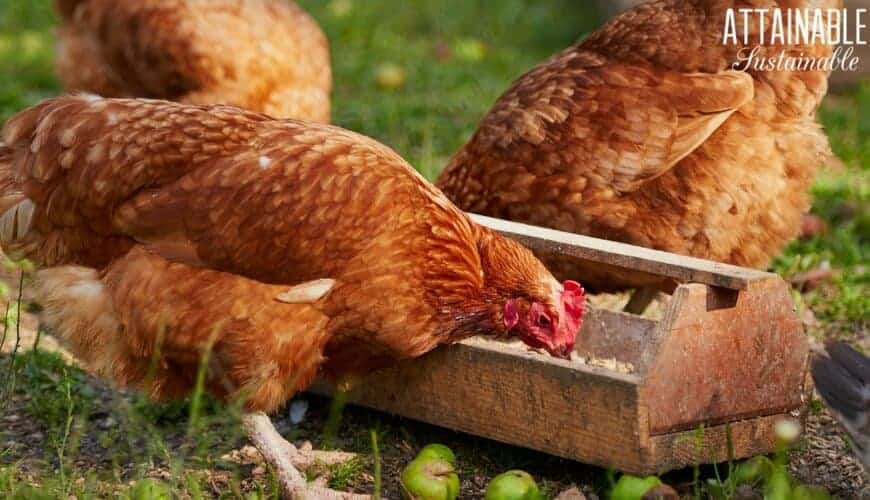
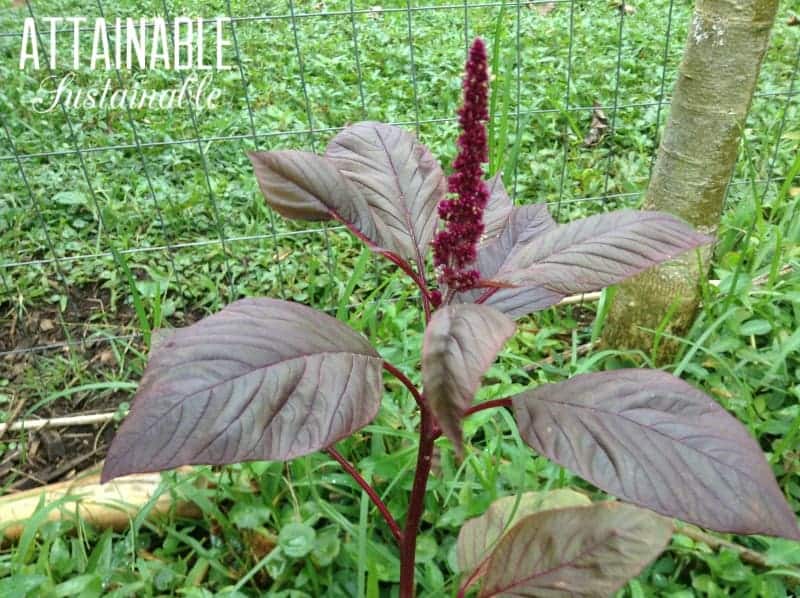
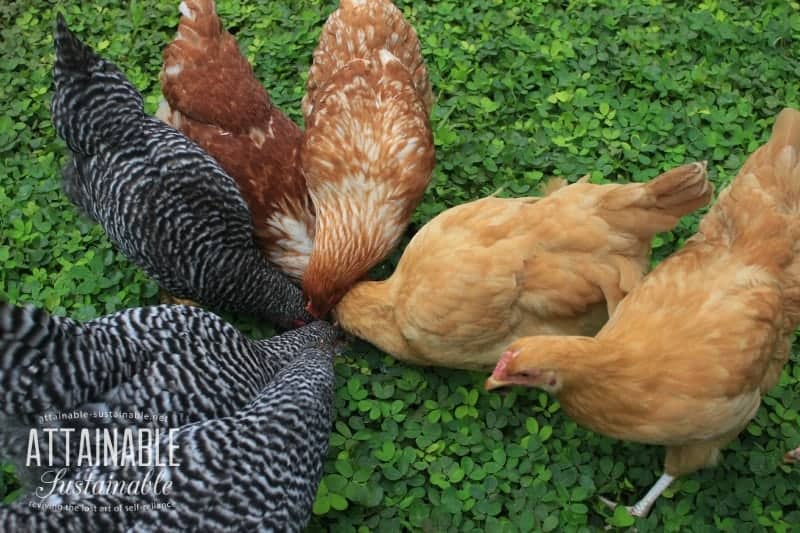
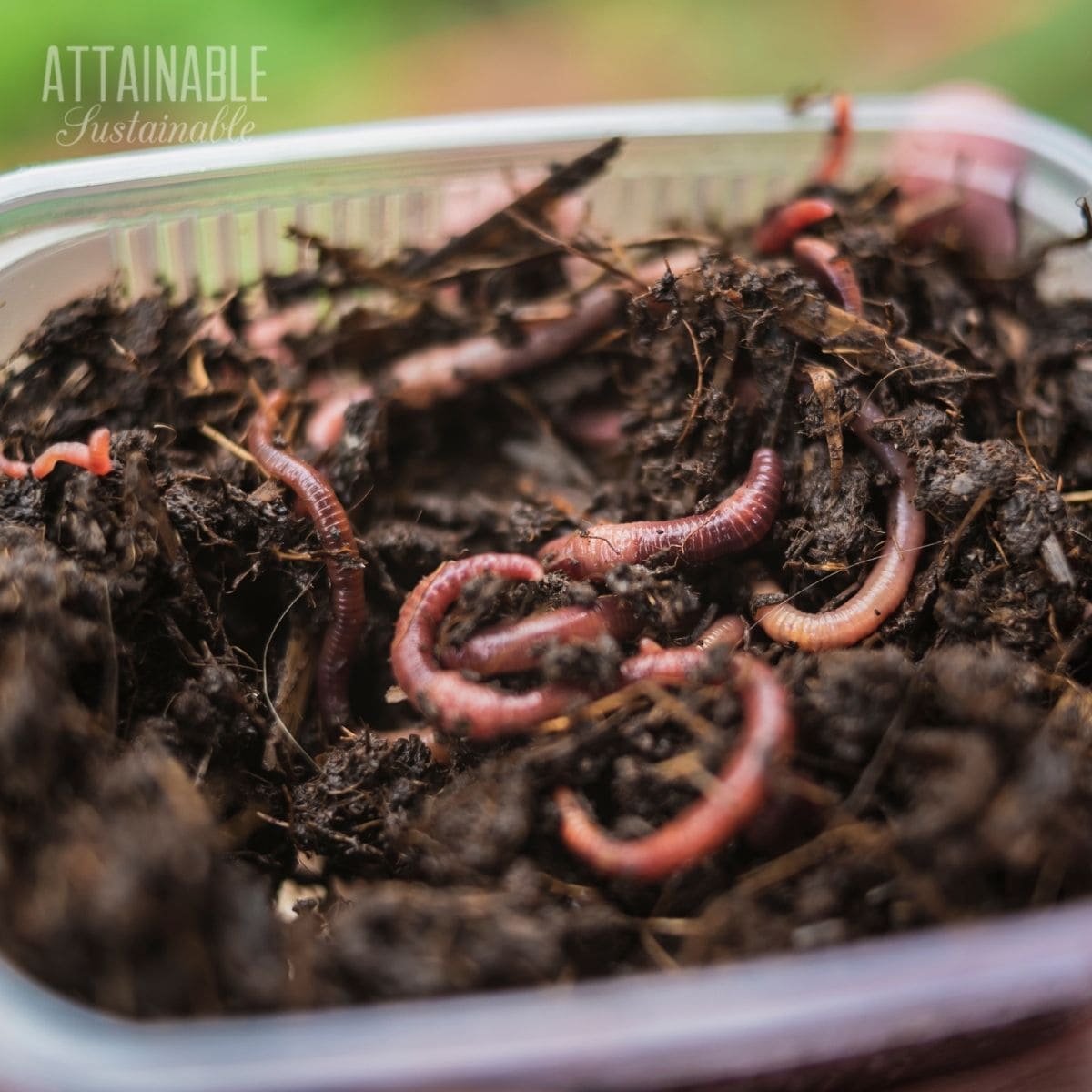
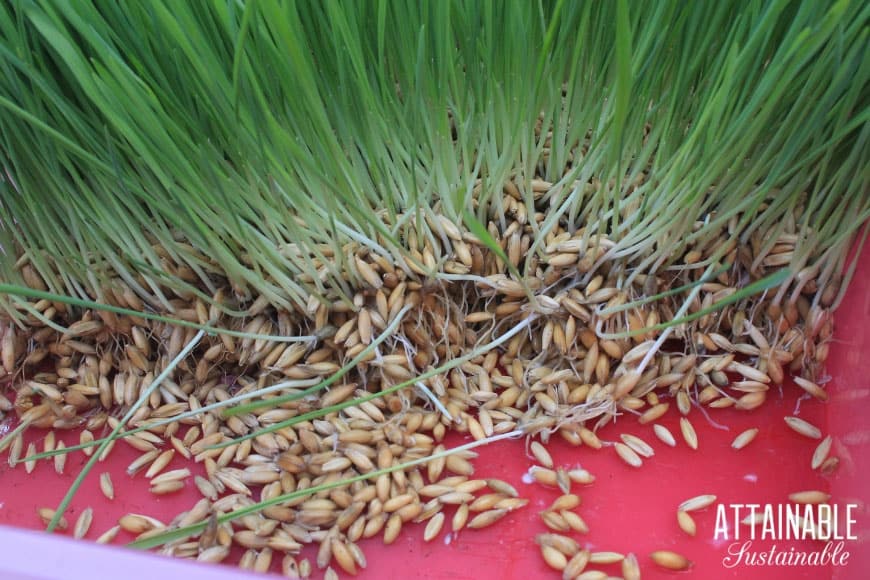
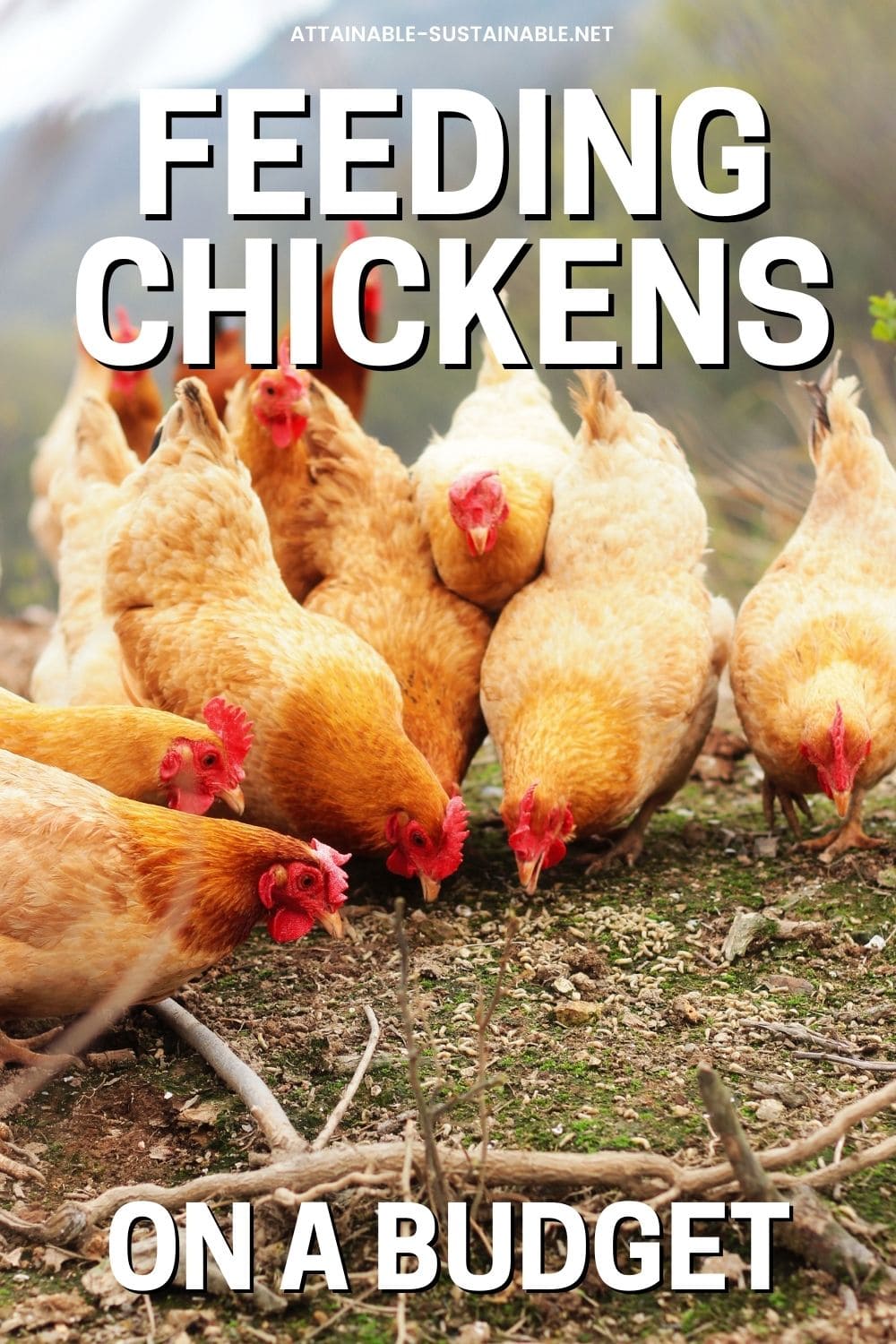
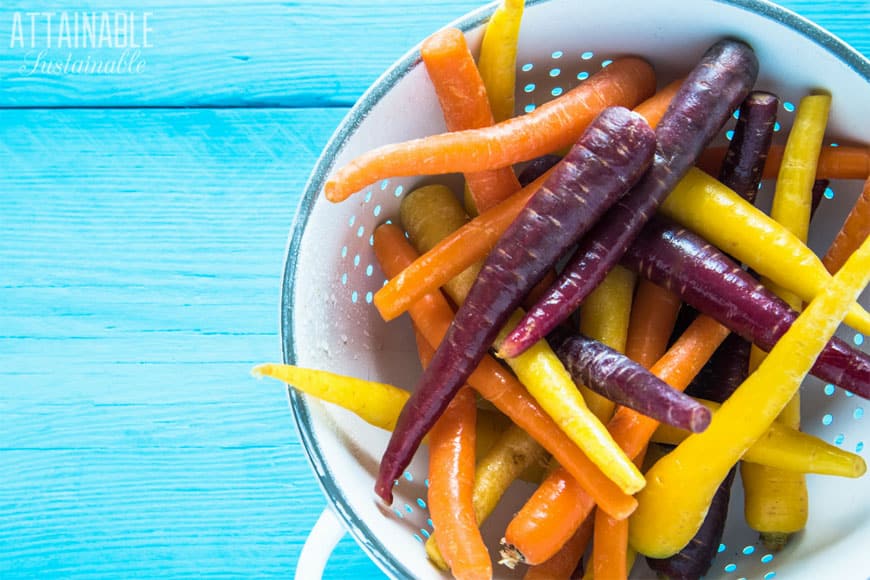


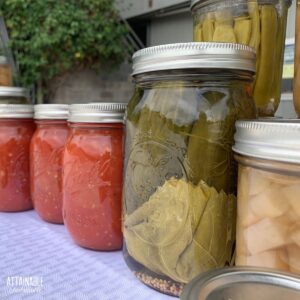
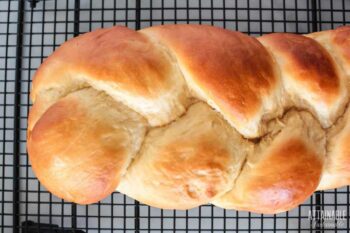
IDK why anyone would think feeding chickens meat is an ethical issue. They’re omnivores, not vegans. Mine will chase down and kill mice and then fight each other to eat them. In the summer I set up a gut bucket to throw in entrails from whatever we’ve butchered into so the flies lay eggs in them, and then the maggots fall out for the hens to eat. Really, chickens are the ultimate garbage disposals. They will eat ANYTHING. Except squash bugs. I guess everyone has a line they won’t cross.
Aloha,
I also live in Hawaii and am planning on getting chicks this spring. I only have one spot in my yard that there is room for a coop but it is 6 inches of black cinder on top of several feet of large rock. My question is will it hurt the chickens to have their run full of cinder rock on the ground instead of sand, straw, or shavings? The coop will have straw and pone shavings but my worry is they may eat the cinder and I am sure that would not be good for them. Your opinion on this would be greatly appreciated. Mahalo, Robin
I wouldn’t worry a bit that they’d eat the cinder. It could be tough on their feet, but tossing grass clippings or yard trimmings could fix that quickly.
Hello, can I feed my chicken only barley and wheat fodder without anything else? If the answer is NO, can you tell me the ratio of fodder to dry wheat please?
This is so variable. I know people who don’t “feed” their hens at all, instead giving them room to forage. Others insist on a high protein diet for the most eggs. Aim for a 15-18% protein blend for egg layers.
Thanks for the info.
I’m officially in. Inspired to feed these girls (and boys if it turns out I have one or two) more affordably. Fermenting grain is already a big difference but I’m totally moving my compost bins into the run. And throwing a couple of boards down to attract the bugs!!
Hi Everyone,Great info here thank you Kris. I have a dozen hens and use wheat and brown rice that I cook every three days with all vegies scraps,a little molasses and potatoes that I don’t need to eat from the garden ,eggshells, bones and whatever else from the kitchen. I buy the wheat and brown rice in 25kg bags (rice when on special only) and they cook into around 250kg so very economical.If you have a wood stove or slow cooker even more so as you can also save on fuel while cooking.All my vegie and weed pullings go into the pen and I have comfrey growing around the outside pen wire for pecking plus a wormwood inside the pen that they use as medicine when they need it. Garlic and a little Apple cider vinegar in their water takes care of worms and parasites too.I have fruit trees growing in their large pen and they get windfall apples and peaches and plums from them too…Plus shade! Clean fresh water is a must with all hens if you want good eggs.
Great ideas — thanks!
I feed my chickens Japanese Beetles that I catch live in a bag trap I get at my local hardware store. Dump the beetles into a bowl of water and watch them devoir the bugs. Like giving a kid a bag of M&Ms or Skittles.
I am also raising mealworms for my quail and chickens. Just started a few weeks a go but will have thousands of worms to feet them for free.
I also plant greens for my birds. The chickens like romaine lettuce and Swiss chard and the quail love kale (say that 10 times fast).
Oh, they love Japanese Beetles!
Very interesting and informative
Hello.
I understand that chickens are insectivores ( They are SUPPOSED TO ONLY eat insects. ) .
If that is true, then I must be harming my body eating commercially bought chickens because EVERY business I know including meat markets and health food stores sell chickens that eat chicken feed made of grain.
So please tell me what is the SAFEST ( for human consumption ) chicken to eat and where do I buy it because I eat chicken almost EVERY day and I’ve already gotten what was diagnosed as ischemic colitis with severe abdominal pain several times and now nummular eczema believed to be caused by parasites. The nummular eczema does NOT go away with healthy eating coming from Dr. Stephen R. Gundry’s book called “The Plant Paradox” .
Thank you for your cooperation.
Chickens are actually omnivores. They eat bugs AND vegetation.
Letting your chickens eat chicken!
It probably has no effect on a small scale but i don’t think it’s right. Its still cannibalism on some level and pretty much how mad cow disease came about. I’m all for sensible feeding practices but chickens shouldn’t eat chicken.
I wanted to sprout grain for mine during the winter, but the oats I had (couldn’t get barley) just molded and wouldn’t sprout. So, I’m stuck with a 50# bag of whole oats…..I thought, why not try cooking it to feed….so that’s what I do. It softens and opens the hull, the chickens are in hog heaven and my egg production throughout the winter has been phenomenal! So, for a $16 bag of whole oats, I can feed 21 chickens for 2 months, they don’t eat as much layer or scratch. I still feed kitchen scraps and they are extremely happy. They haven’t seen the outside since November (it’s now the end of Feb) because of non stop snow and ice storms. I’m hoping to get them outside by the end of March and start the worm farm when it warms up, too. We have had a horrible winter with record cold, snowfall and ice storms. The cooked oats has been a lifesaver! My coop is open on one side but protected from the direct wind. Temps ranged from -14 to 20 F for almost 2 months. The chickens suffered no ill effects, I did lose some eggs that froze before I could collect them!
Great idea to cook those oats.
I feed mine on the end result of the compost bin, i.e. when the compost comes out, I first give it to the hens to dig over and remove all bugs, insects etc, before I use for planting – this happens every weekend, so therefore they get extra fresh protein every 7 days. I also put down about 3 50 litre sacks of fresh horse manure which I get free from a local farmer. They pick it over for seeds and all the fly larvae etc. About a week later, after they have had time to pee and poop on it too, I scoop it up and put it in the compost bin along with leaves etc, which resides inside the hen pen. I use an earthmaker from New Zealand (google it – best compost bin I have ever bought) it consists of three different levels, which get changed about once a week. The compost worms make light work of the mixture and after three to four weeks when I remore the final result, I leave it for the hens to pick over – and so the cycle goes on. Of course I still have grain for them, but they much prefer the insects – all of which I get free of charge!
You’ve done it again Kris. It hadn’t occurred to me to give our chickens access to the compost pile (although, um, they do get into the cow manure piles). Great idea. I linked to your post in a new “best ideas” article. It’s here: custommade.com/blog/raising-chickens-and-ducks/
I’ve seen old trampoline frames covered with chicken wire used to keep chickens safe from preditors.
And old swing sets!
Great article, and so glad to hear that you also aren’t too concerned about a “balanced” diet. I live in the Virgin Islands (slightly more tropical than you), and have a coop of 11 hens and a rooster. I use a deep-bedding method in the coop, made from all yard waste (leaves, windfall fruit, small twigs, banana stalks, grass cuttings, weeds, etc) along with all the household compostables (that the dogs won’t eat) including leftover dog food, mouldy bread, etc. The composting aspect attracts lots of bugs for them, and they turn the top layer on their own – once in a while I turn it deeper for them to get at more bugs. Every few months I’m able to dig out the bottom layer of rich compost for soil enrichment. Alas, I still have to feed some commercial feed – a mix of layer pellets and corn. The Green Amaranth grows like a weed here (ever since planting it a year ago), so I eat the leaves and give all the seed heads to the chickens.
Side note to previous commenters – I used a chicken tractor before, lost many chicks to mongoose, and decided that unless I had a perfectly flat, even field through which to move the thing it just wasn’t labor-efficient. I much prefer my current, predator-proof, stationary situation!
Looking forward to hearing how sprouting fodder goes for you – I’ve tried with corn, but in this heat it tends to either dry out too fast, or stay too wet and get mouldy. Other whole grains are hard to get here.
Keep up the good work! – Merryn
Great ideas. Our chickens love the kitchen scraps, garden scraps, and are constantly scratching their next snack out of cow pies. Yummy!
I never thought about trapping the roaches…that is a great idea…I am going to do it…thanks for sharing. ..Mahalo
I used to trap Japanese Beetles (iridescent green/black) in buckets of water and the hens loved to bob for beetles. I contacted a professor at the U of Minnesota about a nutrition analysis for the beetles as a feed source. She warned me that the spikes on the beetles legs can be harmful to a chicken’s esophagus and recommended crushing or grinding the dead beetles before feeding. When there is a spike in Japanese Beetles we collect them for chicken feed. Trap, freeze, crush, feed.
I never would have thought of that. Thanks for the heads up.
I grow a lot of winter squash and fodder beets to chop into chunks and dole out to my 40plus flock throughout the winter. I also grow extra kale, turnip and lettuce greens for them (from my saved seed- right: FREE). I feed them hard boiled eggshells ground up to supplement the calcium and feed smaller rations of layer pellets and corn depending on the scraps and forage ability throughout the day. When it is below freezing, the house stays closed up to conserve their energy to warm themselves and some whole corn is added at night feeding to be utilized more slowly.
I noticed fodder beets in the rareseeds.com catalog, but my hens won’t eat beets! I do grow extra kale and chard for them, though.
great article. I’m right on base with Ya about the bugs. I keep cedar logs or landscaping posta around the base of the outer fence so once every little bit I e
Walk past them flip them over & BINGo there are the crickets, earthworms, roly polies, so many different types of bugs. The hens love it.
i picked up a live mouse trap at del’s, my girls love the treat when i catch one….
I have been thinking about getting 2 chickens for the backyard. If I put them in a chicken tractor and fed them kitchen scraps, do you have an idea how much I would have to supplement with chicken feed? I like the idea of having garden helpers and fresh eggs, but a neighbor sells eggs for $2/doz and I’m wondering if the garden help(manure, clearing ground, etc.) would be worth the feed costs.
Sarah, That totally depends on how much you have in the way of kitchen scraps! I think you’ll find that having a couple of happy hens around is totally worth it, though. 😉
feeding 2 chickens is a negligable cost
chickens need 1/4 pound of balanced feed a day.
“I’m not talking about fields of wheat here. Though if you have fields of wheat, I suspect you’ve got some pretty happy hens.”
We do have fields of wheat, and we keep some back for the chickens, and also let them pick around in the straw bales to find the berries as well. And they are happy chickens!
I love it when I’m right! LOL
Nice list!
I keep a maggot bucket suspended above the chicken run. All dead stuff goes in there, whether it be waste from the butchering process or the kitchen (if it’s not suitable for the dogs). The contents are covered with straw which keeps the smell minimal and when the maggots appear they fall through the holes in the bottom of the bucket and the chickens go crazy.
It sounds grim, but it’s creating a usable feed from a waste product.
All that’s left is a few bones. Small ones just get chucked on the ground and get broken up and incorporated into the compost in no time. Bigger ones get thrown into the stove, and the resultant ash is reincorporated into the garden. No waste!
https://www.casalinho.com/casalinhos-maggot-breeding-enterprise/
That is 1. gross and 2. BRILLIANT. 😉 Thanks for sharing this. I’ve been wanting to make a soldier fly system, but this could be even easier.
Oh, I read this with enjoyment! I usually spend part of the summer on Kauai and my grandsons (ages 2 and 5) LOVE their chickens. I mean LOVE them. Carry them around on and off all day… Well, this summer grandma (me!) had a shovel and while planting a banana tree, found a worm. For the next 5 weeks, I was the official ‘worm-digger’–and you know how hard it is to dig in Hawaii soil??!!! But every time that shovel went in just a little ways, a few cockroaches would start running…which were immediately grabbed by the boys and fed to their darlings! Good riddance!!!
How fun! (My girls won’t eat worms, the weirdos!)
My hens are disgusted when I offer them worms. I don’t get that. But hey, release a grasshopper in the run and it never sees its next breath.
Isn’t it just the oddest thing to see them walk right past??